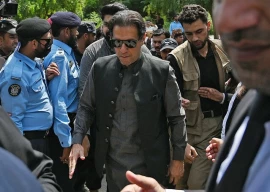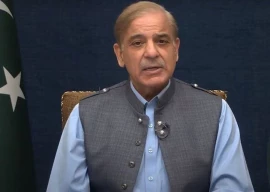
Criticising the existing procedure of judges’ appointment, Pakistan Lawyers Forum counsel AK Dogar has argued that the present system of judges’ appointment under Article 175A of the constitution is based on pick-and-choose policy and, therefore, thousands of eligible lawyers are deprived of becoming a part of the superior judiciary.
Appearing before the Supreme Court full bench, headed by Chief Justice Nasirul Mulk hearing the 18th and 21st amendments cases, Dogar objected to the nomination of judges by the Judicial Commission of Pakistan, saying that thousands of competent lawyers all over the country could not become judges because they belong to the very poor section of society and have no contacts. He said the present system is not only in violation of the law and unconstitutional but also against Islam.

He said that no official car or driver is provided to the judges in England. “They take the underground railway or bus. The salary of a high court judge in India is Rs80,000, but in Pakistan the salary of the apex court’s judge is more than Rs700,000.”
Dogar said poor but competent lawyers should also be considered, and applications should be sought from them for the post of judge.
Citing an example from the UK, he said the Lord Chancellor invites applications from professors, solicitors, the academia, barristers and prosecutors from all over England. “Article 175A should not be read in isolation but with Articles 2A, 9 and 25 of the constitution.”
The court asked Dogar, “Do you think that the present system of judges’ appointment is elitist, that it is a closed club where judges select lawyers of their own kind?”
Appreciating the remarks, Dogar said the present system was based on a pick-and-choose policy. He said the judges’ appointment system should be in accordance with the Holy Quran and the Objectives Resolution.
Justice Saqib Nisar asked Dogar whether he was in favour of an Islamic or a British system for judges’ appointment. “In Islam, judges are appointed by an executive.”
Justice Jawwad S Khawaja said that in an Islamic system there is no need of lawyers, as the parties appear before a Qazi for the settlement of their disputes.
Justice Ijaz Ahmed Chaudhry said because of legal complications, cases could not be decided even after 40 years. “We have become slaves to the system, which is why people are not getting justice.”
Earlier, Dogar had argued that there was a difference between the constituent and the legislative assembly, saying that the former had dissolved after the constitution was drafted.
Justice Ijaz observed that under the 18th amendment, the entire constitution was changed. He questioned if Parliament had the power to do so and use the powers of the constituent assembly.
Dogar said that under the 18th amendment, the clause dealing with intra-party election within political parties and the one that bars the parties from promoting sectarianism or ethnicity had been removed.
He also objected to more than two terms of a prime minister or a chief minister. “There is no democracy in Pakistan, only plutocracy.” After conclusion of his arguments, the court adjourned the hearing until Thursday.
Published in The Express Tribune, May 27th, 2015.



1725030039-0/Untitled-design-(2)1725030039-0-165x106.webp)
1725366721-0/kyle-(1)1725366721-0-165x106.webp)



1732696613-0/BeFunk_§_]__-(59)1732696613-0.jpg)
1732622842-0/Express-Tribune-(9)1732622842-0-270x192.webp)







COMMENTS (1)
Comments are moderated and generally will be posted if they are on-topic and not abusive.
For more information, please see our Comments FAQ